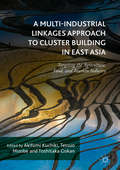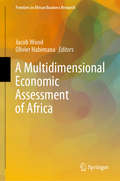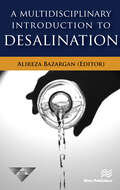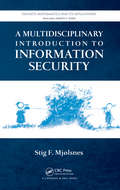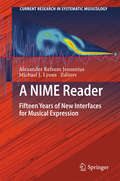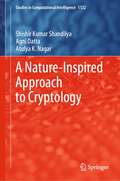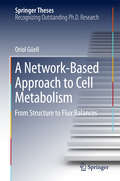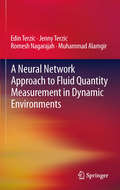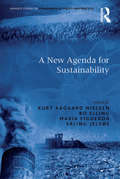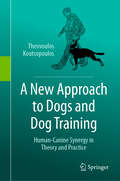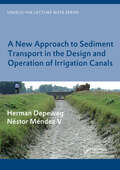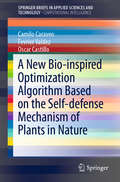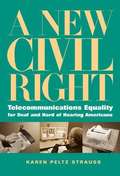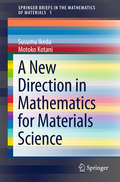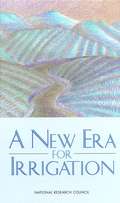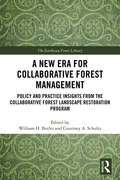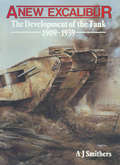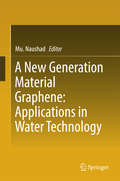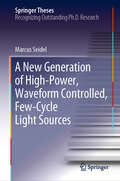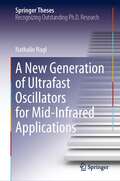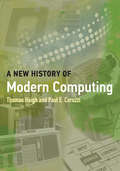- Table View
- List View
A Multi-Industrial Linkages Approach to Cluster Building in East Asia: Targeting the Agriculture, Food, and Tourism Industry
by Akifumi Kuchiki Tetsuo Mizobe Toshitaka GokanThis book proposes measures to promote regional industrial development in East Asia from the perspective of three industries: agriculture, food, and tourism. The authors argue that for regional agriculture to develop, collaboration with the food industry is essential. Further, by linking tourism, economic collaboration between the three industries is strengthened. The first part of the book introduces a basic model for the formation of the agriculture, food, and tourism industry cluster. Contributions from leading academics in agricultural economics then go on to discuss the relevance of this multi-industry cluster in countries such as Japan, the Republic of Korea, and Cambodia, amongst others. The final part sets out new approaches for further development in the cluster through quantitative analyses of the 'economies of sequence' concept. Readers will discover that from establishing linkages between different industries and other economic sectors, important positive externalities can be generated and these processes can be triggered on the local or cluster level.
A Multidimensional Economic Assessment of Africa (Frontiers in African Business Research)
by Jacob Wood Olivier HabimanaThis book is a useful resource for government policy analysts, academics, students of higher education and business practitioners interested in African economies and the key economic issues these economies are facing in 2020. In the face of weak governance and growth globally, there is still a window of opportunity for countries in Africa to build on not only their traditional industrial capabilities, but also pave the way for positive developments in international trade and in the way governments tackle poverty and inequality. By focusing on four areas: (1) agriculture and livestock, (2) consumption, poverty and inequality, (3) financial services, employment and corporate governance, and (4) economic integration, international trade and foreign direct investment (FDI), this book presents a series of empirical studies that examine important contemporary economic issues facing Africa. The book incorporates a range of methodological approaches, with some chapters providing case study analyses while others embrace more traditional forms of econometric testing.
A Multidisciplinary Introduction to Desalination
by Alireza BazarganAlthough more than 70% of the globe is covered with water, only a small portion is suitable for direct human use, making the scarcity of freshwater one of our plant's most serious challenges. In this context "desalination", defined as "the removal of salt from water", is one of the possible solutions for overcoming our planet's municipal and industrial thirst. By drawing upon the authoritative expertise of a remarkable team of international authors, this book aims to provide an encompassing and "multidisciplinary" introduction to various aspects of desalination. The forte of this publication is that it does not overtly focus on a particular sub-topic of desalination, but rather addresses the topic as a whole. In other words, the unique assortment of reader-friendly chapters is designed to strike a delicate balance between the technical and non-technical. The book is divided into five general sections:The first section presents an overview of water scarcity, followed by a review of integrated water management and the alternatives to desalination. The fundamentals of desalination are provided, including simple water chemistry;The second section covers the conventional technologies of today, including thermal and membrane desalination processes. The topics of pre- and post- treatment are given due credit, as no desalination plant can operate without them;The third section reviews the history of how desalination technologies originated, including a review of today's R&D activities and cutting edge research. The processes and engineering applied for membrane manufacturing are also presented;Section four is concerned with energy and environmental issues, including the application of renewable and nuclear energy, minimization of energy usage and the water-energy-nexus, brine management, and environmental impacts;Finally, section five covers the social and commercial issues, ranging from rural desalination, to the politics of desalination. Desalination costs and feasibility are presented, as well as issues in business development and the future market prospects.Effectively, A Multidisciplinary Introduction to Desalination aims to be a holistic go-to-compendium for anyone seeking a balanced understanding of the various facets of desalination
A Multidisciplinary Introduction to Information Security (Discrete Mathematics and Its Applications)
by Stig F. MjølsnesWith most services and products now being offered through digital communications, new challenges have emerged for information security specialists. A Multidisciplinary Introduction to Information Security presents a range of topics on the security, privacy, and safety of information and communication technology. It brings together methods in pure m
A NIME Reader: Fifteen Years of New Interfaces for Musical Expression (Current Research in Systematic Musicology #3)
by Michael J. Lyons Alexander Refsum JenseniusWhat is a musical instrument? What are the musical instruments of the future? This anthology presents thirty papers selected from the fifteen year long history of the International Conference on New Interfaces for Musical Expression (NIME). NIME is a leading music technology conference, and an important venue for researchers and artists to present and discuss their explorations of musical instruments and technologies. Each of the papers is followed by commentaries written by the original authors and by leading experts. The volume covers important developments in the field, including the earliest reports of instruments like the reacTable, Overtone Violin, Pebblebox, and Plank. There are also numerous papers presenting new development platforms and technologies, as well as critical reflections, theoretical analyses and artistic experiences. The anthology is intended for newcomers who want to get an overview of recent advances in music technology. The historical traces, meta-discussions and reflections will also be of interest for longtime NIME participants. The book thus serves both as a survey of influential past work and as a starting point for new and exciting future developments.
A Nation of Farmers
by Sharon Astyk Aaron Newton"Astyk and Newton have written an important book with an unusual message: We need millions of new farmers...as soon as possible. You could not find two more reasonable, intelligent, sincere, and passionate people to talk to about food. And the book has very much the feeling of a conversation - with someone smart who cares about you. It is also intellectually complex, creative and nuanced. The authors are big thinkers and have taken a good lick at the central human issues of our time." Peter Bane "This definitive guide can provide inspiration to gardeners and those concerned about the environment. It offers practical solutions to all the food-related problems brought on by industrialized agriculture and the globalization of food. Very carefully researched and well written, this documents what is wrong and what we can do about it." Connie Krochmal - Bellaonline "This outstanding and well-written compendium of insights and recommendations, of fervent idealism and practical solutions, is highly recommended."--Library Journal Once we could fill our grocery carts with cheap and plentiful food, but not anymore. Cheap food has gone the way of cheap oil. Climate change is already reducing crop yields worldwide. The cost of flying in food from far away and shipping it across the country in refrigerated trucks is rapidly becoming unviable. Cars and cows increasingly devour grain harvests, sending prices skyrocketing. More Americans than ever before require food stamps and food pantries just to get by, and a worldwide food crisis is unfolding, overseas and in our kitchens. We can keep hunger from stalking our families, but doing so will require a fundamental shift in our approach to field and table. A Nation of Farmers examines the limits and dangers of the globalized food system and shows how returning to the basics is our best hope. The book includes in-depth guidelines for: Creating resilient local food systems Growing, cooking, and eating sustainably and naturally Becoming part of the solution to the food crisis The book argues that we need to make self-provisioning, once the most ordinary of human activities, central to our lives. The results will be better food, better health, better security, and freedom from corporations that don't have our interests at heart. This is critical reading for anyone who eats and cares about high-quality food. Sharon Astyk farms in New York, and is the author of Depletion and Abundance. Aaron Newton is a sustainable systems land planner in North Carolina, and is the founding editor of Groovy Green.
A Nature-Inspired Approach to Cryptology (Studies in Computational Intelligence #1122)
by Atulya K. Nagar Shishir Kumar Shandilya Agni DattaThis book introduces nature-inspired algorithms and their applications to modern cryptography. It helps the readers to get into the field of nature-based approaches to solve complex cryptographic issues. This book provides a comprehensive view of nature-inspired research which could be applied in cryptography to strengthen security. It will also explore the novel research directives such as Clever algorithms and immune-based cyber resilience. New experimented nature-inspired approaches are having enough potential to make a huge impact in the field of cryptanalysis. This book gives a lucid introduction to this exciting new field and will promote further research in this domain. The book discusses the current landscape of cryptography and nature-inspired research and will be helpful to prospective students and professionals to explore further.
A Network-Based Approach to Cell Metabolism
by Oriol GüellThis thesis uses a systems-level approach to study the cellular metabolism, unveiling new mechanisms and responses that were impossible to reach with traditional reductionists procedures. The results reported here have a potential application in areas like metabolic engineering and disease treatment. They could also be used in determining the accuracy of the gene essentiality of new genome-scale reconstructions.Different methods and techniques, within the contexts of Systems Biology and the field known as Complex Networks Analysis have been applied in this work to show different features of the robustness of metabolic networks. The specific issues addressed here range from pure topological aspects of the networks themselves to the balance of biochemical fluxes.
A Neural Network Approach to Fluid Quantity Measurement in Dynamic Environments
by Edin Terzic Romesh Nagarajah Muhammad Alamgir Jenny TerzicSloshing causes liquid to fluctuate, making accurate level readings difficult to obtain in dynamic environments. The measurement system described uses a single-tube capacitive sensor to obtain an instantaneous level reading of the fluid surface, thereby accurately determining the fluid quantity in the presence of slosh. A neural network based classification technique has been applied to predict the actual quantity of the fluid contained in a tank under sloshing conditions. In A neural network approach to fluid quantity measurement in dynamic environments, effects of temperature variations and contamination on the capacitive sensor are discussed, and the authors propose that these effects can also be eliminated with the proposed neural network based classification system. To examine the performance of the classification system, many field trials were carried out on a running vehicle at various tank volume levels that range from 5 L to 50 L. The effectiveness of signal enhancement on the neural network based signal classification system is also investigated. Results obtained from the investigation are compared with traditionally used statistical averaging methods, and proves that the neural network based measurement system can produce highly accurate fluid quantity measurements in a dynamic environment. Although in this case a capacitive sensor was used to demonstrate measurement system this methodology is valid for all types of electronic sensors. The approach demonstrated in A neural network approach to fluid quantity measurement in dynamic environments can be applied to a wide range of fluid quantity measurement applications in the automotive, naval and aviation industries to produce accurate fluid level readings. Students, lecturers, and experts will find the description of current research about accurate fluid level measurement in dynamic environments using neural network approach useful.
A Neurophenomenology of Awe and Wonder: Towards a Non-Reductionist Cognitive Science (New Directions In Philosophy And Cognitive Science)
by Shaun Gallagher Lauren Reinerman-Jones Bruce Janz Patricia Bockelman Jörg TremplerA Neurophenomenology of Awe and Wonder
A New Agenda for Sustainability (Routledge Studies in Environmental Policy and Practice)
by Bo Elling Erling JelsøeTwo decades after the Brundtland Commission's Report "Our Common Future" adopted the concept of 'sustainable development', this book provides a renewal of the concept exploring the potential for new practices and fields for those involved in sustainability activity. The book addresses a number of themes concerning firstly, the provision of a "next generation perspective", which was a central, and still unresolved, notion of the original Brundtland definition and, secondly the provision of new milestones for policy and research that can expand the discussion on this second generation concept on sustainability. The material dealt with in the book offers a wide variety of perspectives on sustainability and reflects the importance of interdisciplinary and transdiciplinary work in the field. Suggesting targets for future analytical and political efforts in achieving global sustainability, this book offers new analytical opportunities for holistic politics and research at a general and sector level.
A New Approach to Dogs and Dog Training: Human-Canine Synergy in Theory and Practice
by Theovoulos KoutsopoulosThis book presents a new and innovative concept in dealing with dogs: the human-canine synergy (HCS), characterized by a holistic nature and its differentiation from unidimensional terms expressing the affiliation of humans and dogs (Relationship, Interaction, Bonding). Related to the use and training by humans, it applies three main categories of dogs: a) the empathy/therapeutic individuals, which are dogs helping persons with empathy- or therapeutic needs; b) assisting/working dogs carrying out specific actions to aid or assist humans perform specific tasks; and c) the facilitating/inspiring dogs, which enable or improve various human activities, including classroom dogs for teaching and learning purposes in almost all educational subjects.Organized in three parts, chapters address the following needs:• The first section illuminates the concept of HCS as well as basic principles determining this synergy and consequently the process of training dogs (owners and professional trainers). Readers will understand the role of a dog's personality, behavior and especially temperament in its successful training.• In a scientifically documented way, the second part guides those who wish to engage in dog training (amateur or professional). It describes basic training forms within the HCS framework (obedience, protection, detection and classroom dog) and necessary steps for proper completion.• The third book part describes the business of dog training with multi-dimensional approach by emphasizing a good understanding and knowledge of interactions and the environment in which trainer, owner and dog typically operate.Overall, this work is a valuable read for anyone who deals with our four-legged companions for business or pleasure.
A New Approach to Sediment Transport in the Design and Operation of Irrigation Canals: UNESCO-IHE Lecture Note Series (Ihe Delft Lecture Note Ser.)
by Herman Depeweg Néstor Méndez VThe transport of sediment greatly influences the sustainability of an irrigation system. Erosion and deposition not only increase maintenance costs, but may result in an inequitable and inadequate distribution of irrigation water. Understanding the behaviour and transport of sediment allows efficient planning and reliable water delivery schedules,
A New Bio-inspired Optimization Algorithm Based on the Self-defense Mechanism of Plants in Nature (SpringerBriefs in Applied Sciences and Technology)
by Oscar Castillo Fevrier Valdez Camilo CaraveoThis book presents a new meta-heuristic algorithm, inspired by the self-defense mechanisms of plants in nature. Numerous published works have demonstrated the various self-defense mechanisms (survival strategies) plants use to protect themselves against predatory organisms, such as herbivorous insects. The proposed algorithm is based on the predator–prey mathematical model originally proposed by Lotka and Volterra, consisting of two nonlinear first-order differential equations, which allow the growth of two interacting populations (prey and predator) to be modeled. The proposed meta-heuristic is able to produce excellent results in several sets of benchmark optimization problems. Further, fuzzy logic is used for dynamic parameter adaptation in the algorithm.
A New Civil Right: Telecommunications Equality for Deaf and Hard of Hearing Americans
by Karen Peltz StraussKaren Peltz Strauss reveals how the paternalism of the hearing-oriented telecommunications industries slowed support for accessible technology for the deaf and hard of hearing users.
A New Direction in Mathematics for Materials Science (SpringerBriefs in the Mathematics of Materials #1)
by Susumu Ikeda Motoko KotaniThis book is the first volume of the SpringerBriefs in the Mathematics of Materials and provides a comprehensive guide to the interaction of mathematics with materials science. The anterior part of the book describes a selected history of materials science as well as the interaction between mathematics and materials in history. The emergence of materials science was itself a result of an interdisciplinary movement in the 1950s and 1960s. Materials science was formed by the integration of metallurgy, polymer science, ceramics, solid state physics, and related disciplines. We believe that such historical background helps readers to understand the importance of interdisciplinary interaction such as mathematics-materials science collaboration. The middle part of the book describes mathematical ideas and methods that can be applied to materials problems and introduces some examples of specific studies--for example, computational homology applied to structural analysis of glassy materials, stochastic models for the formation process of materials, new geometric measures for finite carbon nanotube molecules, mathematical technique predicting a molecular magnet, and network analysis of nanoporous materials. The details of these works will be shown in the subsequent volumes of this SpringerBriefs in the Mathematics of Materials series by the individual authors. The posterior section of the book presents how breakthroughs based on mathematics-materials science collaborations can emerge. The authors' argument is supported by the experiences at the Advanced Institute for Materials Research (AIMR), where many researchers from various fields gathered and tackled interdisciplinary research.
A New Era For Irrigation
by Committee on the Future of Irrigation in the Face of Competing DemandsIrrigated agriculture has played a critical role in the economic and social development of the United States--but it is also at the root of increasing controversy. How can irrigation best make the transition into an era of increasing water scarcity? In A New Era for Irrigation, experts draw important conclusions about whether irrigation can continue to be the nation's most significant water user, what role the federal government should play, and what the irrigation industry must do to adapt to the conditions of the future. A New Era for Irrigation provides data, examples, and insightful commentary on issues such as Growing competition for water resources. Developments in technology and science. The role of federal subsidies for crops and water. Uncertainties related to American Indian water rights issues. Concern about environmental problems. And more. The committee identifies broad forces of change and reports on how public and private institutions, scientists and technology experts, and individual irrigators have responded. The report includes detailed case studies from the Great Plains, the Pacific Northwest, California, and Florida, in both the agricultural and turfgrass sectors. The cultural transformation brought about by irrigation may be as profound as the transformation of the landscape. The committee examines major facets of this cultural perspective and explores its place in the future. A New Era for Irrigation explains how irrigation emerged in the nineteenth century, how it met the nation's goals in the twentieth century, and what role it might play in the twenty-first century. It will be important to growers, policymakers, regulators, environmentalists, water and soil scientists, water rights claimants, and interested individuals.
A New Era for Collaborative Forest Management: Policy and Practice insights from the Collaborative Forest Landscape Restoration Program (The Earthscan Forest Library)
by William H. Butler Courtney A. SchultzThis book assesses the Collaborative Forest Landscape Restoration Program (CFLRP) and identifies lessons learned for governance and policy through this new and innovative approach to collaborative forest management. Unlike anything else in US public land management, the CFLRP is a nationwide program that requires collaboration throughout the life of national forest restoration projects, joining agency partners and local stakeholder groups in a kind of decade-long restoration marriage. This book provides a comprehensive assessment of the governance dynamics of the program, examining: questions about collaborative governance processes and the dynamics of trust, accountability and capacity; how scientific information is used in making decisions and integrated into adaptive management processes; and the topic of collaboration through implementation, an underdeveloped area of collaborative governance literature. Bringing together chapters from a community of social science and policy researchers who have conducted studies across multiple CFLRP projects, this volume generates insights, not just about the program, but also about dynamics that are central to collaborative and landscape approaches to land management and relevant for broader practice. This volume is a timely and important contribution to environmental governance scholarship. It will be of interest to researchers and students of natural resource management, environmental governance, and forestry, as well as practitioners and policy makers involved in forest and ecosystem restoration efforts, and collaborative natural resource management more broadly.
A New Era for Microbial Corrosion Mitigation Using Nanotechnology: Biocorrosion and Nanotechnology (Advances in Material Research and Technology)
by Basma A. Omran Mohamed Omar Abdel-SalamThis book focuses on corrosion and microbial corrosion, providing solutions for these problems based on nanotechnology and nanobiotechnology. It introduces the causes, consequences, cost and control of corrosion processes. It gives a particular emphasis on microbial corrosion of steel and other metals in oil, gas and shipping industries. The book presents the materials vulnerable to such kind of corrosion, and the use of nanomaterials to control it.
A New Excalibur: The Development of the Tank 1909–1939
by A. J. SmithersThe story of the inventors, engineers, soldiers, and politicians behind the emergence of the armored fighting vehicle. The birth and infancy of the tank had an enormous number of technical problems to be solved—but the issues with its construction paled in comparison to the endless squabbles among the people involved. This fascinating study of the vehicle which was born out of the stalemate of the Western Front in the First World War looks at all the obstacles that had to be overcome. As is inevitable in almost any work of history set in the first half of the century, the figure of Winston Churchill looms large—but the role that he played in this instance is remarkable even by his standard, when it is remembered that at the crucial time he was First Lord of the Admiralty and theoretically had nothing to do with warfare on land. Foremost among the leading actors in the drama are Sir Eustace Tennyson-d&’Eyncourt, Sir Ernest Swinton, Bertie Stern, Sir William Tritton, and Walter Gordon Wilson. This is the first exhaustive study of the men behind the earliest tanks. The story of their furious quarrels and the machines they produced combine to make a remarkable and compelling study.
A New Family of CMOS Cascode-Free Amplifiers with High Energy-Efficiency and Improved Gain
by Ricardo Filipe Póvoa João Carlos Goes Nuno Cavaco HortaThis book addresses the need for energy-efficient amplifiers, providing gain enhancement strategies, suitable to run in parallel with lower supply voltages, by introducing a new family of single-stage cascode-free amplifiers, with proper design, optimization, fabrication and experimental evaluation. The authors describe several topologies, using the UMC 130 nm CMOS technology node with standard-VT devices, for proof-of-concept, achieving results far beyond what is achievable with a classic single-stage folded-cascode amplifier. Readers will learn about a new family of circuits with a broad range of applications, together with the familiarization with a state-of-the-art electronic design automation methodology used to explore the design space of the proposed circuit family.
A New Generation Material Graphene: Applications in Water Technology
by Mu. NaushadThis book presents a unique collection of up-to-date applications of graphene for water science. Because water is an invaluable resource and the intelligent use and maintenance of water supplies is one of the most important and crucial challenges that stand before mankind, new technologies are constantly being sought to lower the cost and footprint of processes that make use of water resources as potable water as well as water for agriculture and industry, which are always in desperate demand. Much research is focused on graphene for different water treatment uses. Graphene, whose discovery won the 2010 Nobel Prize in physics, has been a shining star in the material science in the past few years. Owing to its interesting electrical, optical, mechanical and chemical properties, graphene has found potential applications in a wide range of areas, including water purification technology. A new type of graphene-based filter could be the key to managing the global water crisis. According to the World Economic Forum's Global Risks Report, lack of access to safe, clean water is the biggest risk to society over the coming decade. Yet some of these risks could be mitigated by the development of this filter, which is so strong and stable that it can be used for extended periods in the harshest corrosive environments, and with less maintenance than other filters on the market. The graphene-based filter could be used to filter chemicals, viruses, or bacteria from a range of liquids. It could be used to purify water, dairy products or wine, or in the production of pharmaceuticals. This book provides practical information to all those who are involved in this field.
A New Generation of High-Power, Waveform Controlled, Few-Cycle Light Sources (Springer Theses)
by Marcus SeidelThis thesis presents first successful experiments to carrier-envelope-phase stabilize a high-power mode-locked thin-disk oscillator and to compress the pulses emitted from this laser to durations of only a few-optical cycles. Moreover, the monograph introduces several methods to achieve power-scalability of compression and stabilization techniques. All experimental approaches are compared in detail and may serve as a guideline for developing high-power waveform controlled, few-cycle light sources which offer tremendous potential to exploit extreme nonlinear optical effects at unprecedentedly high repetition rates and to establish table-top infrared light sources with a unique combination of brilliance and bandwidth. As an example, the realization of a multi-Watt, multi-octave spanning, mid-infrared femtosecond source is described. The thesis starts with a basic introduction to the field of ultrafast laser oscillators. It subsequently presents additional details of previously published research results and establishes a connection between them. It therefore addresses both newcomers to, and experts in the field of high-power ultrafast laser development.
A New Generation of Ultrafast Oscillators for Mid-Infrared Applications (Springer Theses)
by Nathalie NaglThis thesis presents the first successful realization of a compact, low-noise, and few-cycle light source in the mid-infrared wavelength region. By developing the technology of pumping femtosecond chromium-doped II-VI laser oscillators directly with the emission of broad-stripe single-emitter laser diodes, coherent light was generated with exceptionally low amplitude noise — crucial for numerous applications including spectroscopy at high sensitivities. Other key parameters of the oscillator's output, such as pulse duration and output power, matched and even surpassed previous state-of-the-art systems. As a demonstration of its unique capabilities, the oscillator's powerful output was used to drive — without further amplification — the nonlinear generation of coherent mid-infrared light spanning multiple octaves. The resulting table-top system uniquely combines high brilliance and ultrabroad spectral bandwidth in the important mid-infrared spectral range. The rapid development of this technology is comprehensively and lucidly documented in this PhD thesis. Together with a thorough review of literature and applications, and an extensive analysis of the theoretical foundations behind ultrafast laser oscillators, the thesis will serve as a valuable reference for the construction of a new generation of mid-infrared light sources.
A New History of Modern Computing (History of Computing)
by Paul E. Ceruzzi Thomas HaighHow the computer became universal.Over the past fifty years, the computer has been transformed from a hulking scientific supertool and data processing workhorse, remote from the experiences of ordinary people, to a diverse family of devices that billions rely on to play games, shop, stream music and movies, communicate, and count their steps. In A New History of Modern Computing, Thomas Haigh and Paul Ceruzzi trace these changes. A comprehensive reimagining of Ceruzzi's A History of Modern Computing, this new volume uses each chapter to recount one such transformation, describing how a particular community of users and producers remade the computer into something new. Haigh and Ceruzzi ground their accounts of these computing revolutions in the longer and deeper history of computing technology. They begin with the story of the 1945 ENIAC computer, which introduced the vocabulary of "programs" and "programming," and proceed through email, pocket calculators, personal computers, the World Wide Web, videogames, smart phones, and our current world of computers everywhere--in phones, cars, appliances, watches, and more. Finally, they consider the Tesla Model S as an object that simultaneously embodies many strands of computing.
